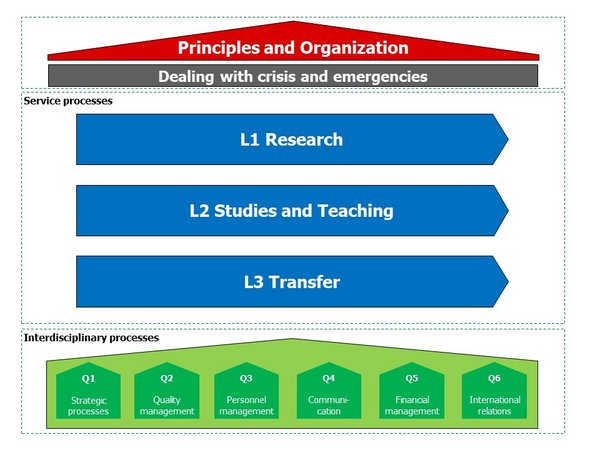Quality Management System
The legally binding basis for the introduction of a quality management system at universities is laid down in the Universities Act UG 2002 in § 14 (1).
Quality management refers to all organizational measures that serve to improve process quality and performance. The quality management system defines which processes and structures contribute to quality development and quality assurance.
The quality management system is oriented towards the performance processes, whose results form the added value of the Technical University of Leoben. Through this approach, the organizational structure is moved into the background and the focus is placed on the processes. In this way, the Technical University of Leoben aims to present its value-added processes and improve them in a targeted manner.
Throughout the university, with the introduction of a process-oriented QM system, the decision was made to focus on ex ante quality assurance and thus to support the implementation of the strategic goals and quality objectives defined in the development plan. The control loop principle plays an important role on three levels:
- the societal level (performance agreement - intellectual capital statement and financial statement - discussions accompanying the performance agreement)
- the institutional level (target agreement discussions)
- the individual level (employee appraisal interviews)
The three levels are related to each other through the cascade performance agreement - target agreement discussions - employee discussions.
For the understanding of quality at the Technical University of Leoben, the continuous development of quality in all areas through the effective and efficient use of available resources from public funds and through the orientation towards excellence and top performance is quite essential. Quality subjects are the performance areas:
- Reseatch
- Studies and Teaching
- Transfer - Innovation - Social Objectives
- Organization - Administration - Personnel
In a comprehensive participatory process, quality objectives were derived for these performance areas based on the strategic goals of the Technical University of Leoben and key figures as well as indicators were defined.
External stakeholders, such as the Federal Ministry of Education, Science and Research (BMBWF), are involved, e.g. through the intellectual capital statement, which has to be prepared annually. This data is made publicly available by the BMBWF on the uni:data web platform.
The processes are mapped using the process landscape, which is based on the development plan. The central elements are the three performance processes of research, studies and teaching as well as transfer. The QM system is described in Principles and Organization. The handling of crises and emergencies describes all processes that have to be carried out in the event of a crisis. The six cross-sectional processes represent the management process.
The knowledge about processes and responsibilities is documented in so-called process flows.

